
Eric & Hattie & Things!!!! (1962)
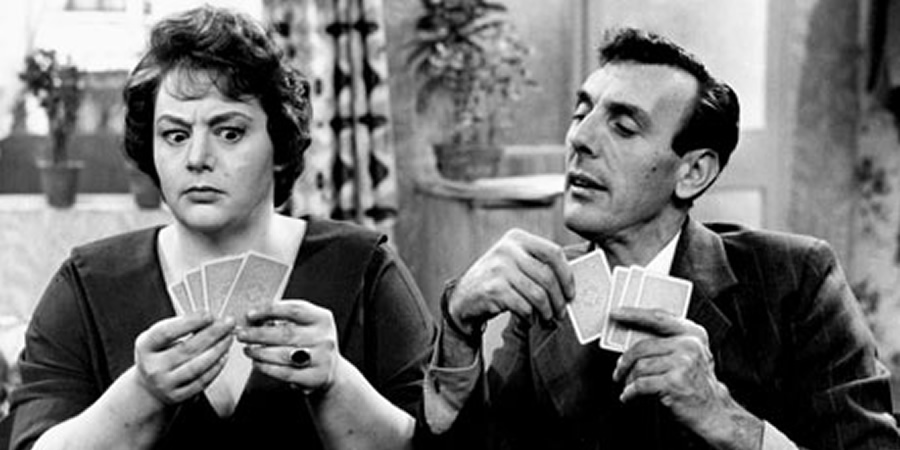
1962 - Eric Sykes and Hattie Jacques
Eric & Hattie & Things!!!!
Decca LK4507
Few comedy writers and performers have enjoyed a career as long and as successful as Eric Sykes. Not for him the constant falling in and out of favour that many of his contemporaries had to endure, courting the vagaries of fashion and struggling through long periods of obscurity. From the end of the Second World War until his death in 2012 he was in constant demand as a creator of many imaginative comedies, a reliable writer of material, a successful director, and also as an acclaimed and accomplished actor.
Born in Oldham in 1923, there was nothing in Eric Sykes's early life that indicated he was destined for such a successful career in showbusiness. Early jobs at a timber merchant, a painters' and a greengrocer came and went with a mixture of ineptitude and general indifference on his part. A longer stay at the large Rutland cotton mill in Shaw, where his duties largely consisted of avoiding work and hiding from his superiors in a store room, also did little to show what was to come.
It was, as with so many of his generation, the outbreak of the Second World War that put an end to Eric's life of loafing, incompetence and daydreaming. Desperate to patrol the skies of England as a fighter pilot, he volunteered for the RAF as soon as he turned 18. The RAF though had other plans and decided that his skills would be better suited to becoming a wireless operator rather than one of the few defending the country from the Luftwaffe. Following an itinerant period of training, moving around various radio stations in England, the 1944 D-Day landings finally propelled Eric Sykes into Europe and into the front line of military action.
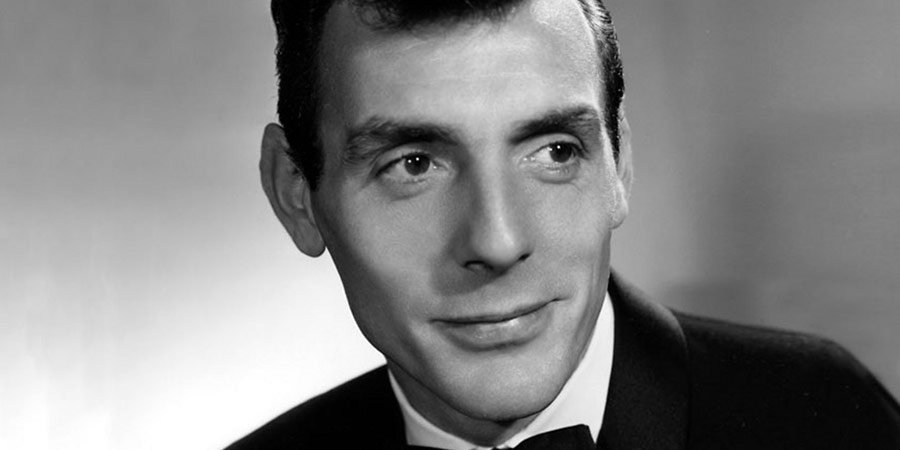
After surviving the horrors of the Normandy landings, Sykes journeyed through Europe as the Allies gradually advanced on Berlin. There was still no indication of any showbiz leanings though; no gang shows, concert parties or impromptu morale-boosting performances delivered from the back of a truck. It was instead his old friends, ennui and boredom, that finally nudged Eric Sykes towards a career in showbusiness. In 1945, the European conflict at an end, Sykes found himself stationed in Schleswig Holstein with the occupying forces, again idling his days away, waiting desperately for demob and a ticket home. Purely in order to pass the time and with no act or previous experience, he blagged his way into a concert party under a false name, deploying some impressive yet completely fictitious boasting. It was a fortuitous move.
That post-war concert party was blessed with some genuine star talent, despite Eric's best efforts to lower the tone. The Flight Lieutenant in charge was none other than comic actor Bill Fraser, who had enjoyed West End success before the war and would pick up where he left off after the conflict. The material too was high quality, supplied as it was by future TV stalwart Denis Norden and his then partner Ron Rich. The three shows that they wrote and produced were lifted by Fraser's professional attitude and approach, and those productions became Sykes's first taste of performing. Excused from tedious military duties, the troupe toured around Germany and Denmark playing to appreciative crowds. It was a happy time, and Eric's mind was made up: for the first time in his life he had a purpose.
Returning to Blighty after his long-waited demob, Eric moved from Oldham to London and into a freezing cold bedsit determined to forge a showbiz career, despite no offer of a job and precious little prospect of securing one. As the weeks wore on, no work was found. Starving, cold, penniless and wandering the streets, Eric found himself shuffling along London's Embankment in a daze, and was perplexed to hear someone call out his name. It was none other than his old RAF pal Bill Fraser, then starring in Eric Maschwitz's revue Between Ourselves at the Playhouse Theatre. Seeing the pathetic bedraggled figure of Sykes before him, Fraser invited his former comrade-in-arms into his dressing room. After a meal of salmon sandwiches purchased to prevent him from fainting, Fraser offered Sykes three weeks of work for £5 a week to write material for him. Eric Sykes never did actually write any material for Bill Fraser, but the money was enough to prevent him from dying and enabled him to return to the quieter and less cutthroat world of Oldham, and to the repertory theatre of Oldham Coliseum, where he finally made his professional stage debut in the March of 1947.
While at the Coliseum, Sykes had submitted material to the popular BBC radio show Variety Bandbox; much of it shamelessly cribbed from US forces radio broadcasts, but it proved enough to bring him to the attention of the show's star, Frankie Howerd. Travelling to Leeds where Howerd was in pantomime, Eric arrived full of eagerness but without any actual material. Challenged by Howerd to demonstrate his writing talents, Sykes remained in the star's dressing room while Howerd did his thing on stage and there wrote his first ever original script. Detailing an improbable story of Howerd delivering two elephants to Crewe, it was just the sort of long, rambling shaggy dog story - interspersed with trademark hesitations and deviations - that Howerd was looking for. Eric Sykes was now both a bona fide stage actor, and writer to one of the UK's most popular comedy stars. It was the start of a long and successful career.
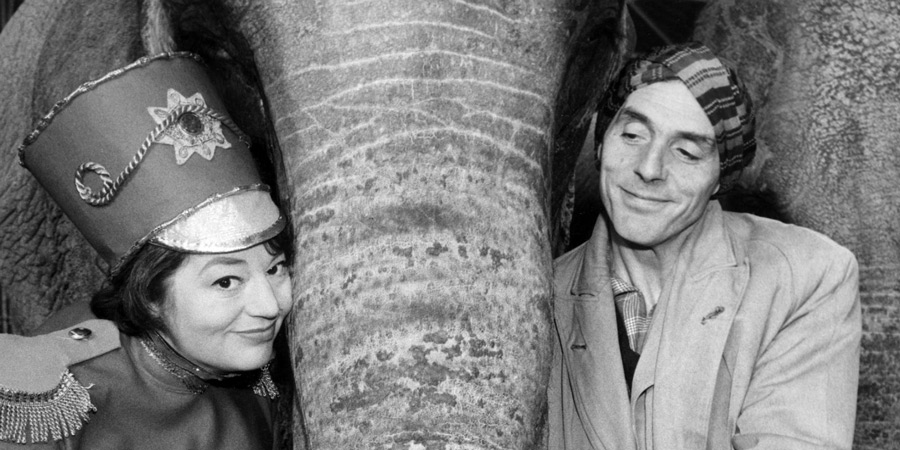
Following spells writing material for the radio show Educating Archie, Sykes soon graduated to television, writing for Frankie Howerd as he too moved into the new medium. During the 1950s Sykes proved his worth as a reliable jobbing script writer and worked for some of the biggest names of the era: Harry Secombe, Peter Sellers, Tony Hancock, Dick Emery, and on one occasion the American actress Jane Russell. He would also work with Spike Milligan on scripts for The Goon Show in an attempt to ease the latter's burden as the sole writer of material. It was another old RAF acquaintance Denis Norden who would give Sykes his second big break, this time as a writer and TV performer.
A situation comedy proposal by Sykes's friend and fellow scriptwriter Johnny Speight had been submitted to the BBC, where Norden and his writing partner Frank Muir were by then acting as comedy consultants. It was proposed that Eric star alongside established comedy actress Hattie Jacques - with whom he had previously worked on radio and on stage, and more recently in in the 1959 TV show Gala Opening, written and directed by Sykes.
The original concept as envisioned by Speight was a traditional sitcom set up seeing the pair as husband and wife, beset by the antics of their socially superior next-door neighbour. Sykes though had the rather brilliant and novel notion that Eric and Hattie should instead be cast as brother and sister, a dynamic that would allow the two to tolerate each other's more annoying quirks and foibles without any underlying marital tensions, and allow for romances should the plot demand it. But not just siblings - twins. Identical twins. The joke (presaging the 1988 film Twins by nearly 30 years) being that the large rotund Jacques and the thin and drawn Sykes looked absolutely nothing alike. Also to appear in the new show were Deryck Guyler as the friendly neighbourhood police officer, and Richard Wattis as the officious and snobbish neighbour, a role originally offered to Hattie's then husband, John Le Mesurier.
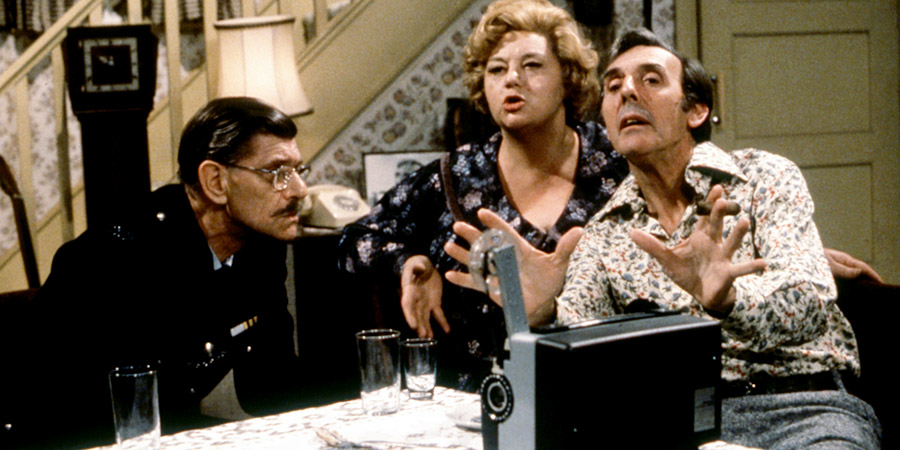
The sitcom launched as Sykes And A..., with a different weekly theme completing the title of each programme. That ever changing theme allowed Sykes to craft a distinctive half hour of inventive comedy that would evolve each episode, and allow for diverse individual plots that would see Eric and Hattie battle such random things as mice, ghosts, disease, camping trips, hypnotists and most notably, errant planks of wood. The first series was written by Johnny Speight but afterwards Eric Sykes assumed near-sole responsibility, with assistance on Series 2 from John Antrobus and Spike Milligan. The show would run for five years and sixty episodes until 1965, then return in 1972 as Sykes, where it remained onscreen for another seven years and a further 68 programmes.
By 1962 Sykes And A... was onto its fifth series and very much a well-established favourite with TV audiences, and Decca cashed in on that success with the release of Eric & Hattie & Things!!!!. The characters that Sykes had created for the pair were now well-loved by viewers: Hattie played against type as a sweet and trusting innocent, bewildered and bemused by the world around her but fiercely loyal to Eric despite all his erratic antics. It was a world away from her archetypal battle-axe matron of the Carry On films, or the stern, cynical Miss Pugh of Hancock's Half Hour. Eric was the naïve schemer, an overgrown child full of endless mad schemes and plans that would invariably land them in some disastrous comic predicament. However, by and large those television alter-egos are ignored on Eric & Hattie & Things!!!! in favour of new material created especially for the album. All that is apart from the B-side track, We Go Together.
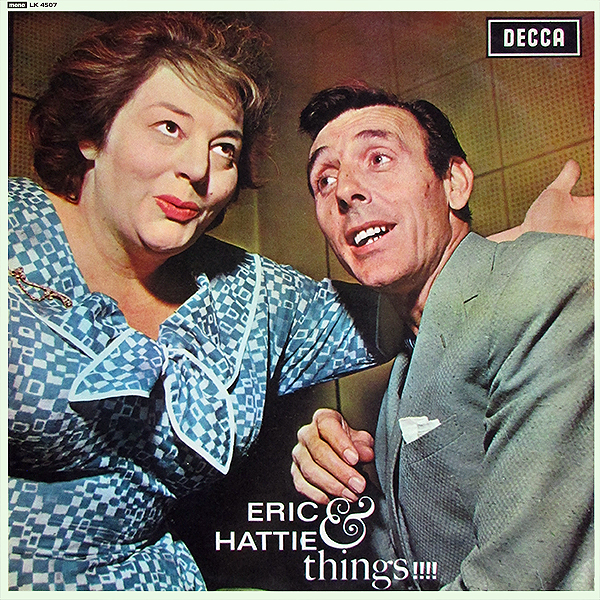
I should declare that We Go Together is for me the highlight of the record. The song sees Eric and Hattie playing a brother and sister reminiscing about a holiday. It feels very much like a spin-off to the TV series, with the pair singing and talking like they have just wandered off the sitcom set to warble away around a piano. Given the public affection for both the real and fictional Eric and Hattie it would have made a perfect single release. That honour though inexplicably went to the A-side album opener, Dr Kildare. It's an odd choice as it is by and large a spoken word piece with the familiar theme tune to the US medical drama of the same name tinkling gently away in the background. Eric plays a smooth American doctor dancing and romancing his patient (Hattie) as an improbable alternative to using anaesthetic. The denouement of Hattie being stabbed with a scalpel and screaming in pain isn't a great payoff, but that is what is delivered. I personally can't imagine how it trumped We Go Together to earn a single release but there you are!
The merits of the B-side to the Dr Kildare single, Bedtime Story are equally baffling to me. Again, a cheery comic song would have seemed the logical choice but instead another spoken word sketch was preferred. The track sees Hattie playing a young child, whose father (Eric) is attempting to read a bedtime story despite her continuous interruptions with increasingly irrelevant questions. Hattie's child, who sounds uncannily like her Sophie Tuckshop character from the wartime radio series ITMA, is more annoying than sweet though and the sketch again peters out without much of a punchline or payoff.
However, there are two more songs that redeem the album. A comic mangling of the Cole Porter song I Love Paris is a joy as Eric and Hattie bicker and fight in their efforts to outdo each other with their love of Paris. Cleverly, while Porter's lyrics stay the same it is the pair's voices and intonation that bring all the venom, anger and competitiveness out. Cockles And Mussels is another clever play on a familiar tune. As Eric sings the tradition Irish lament, Hattie plays along as a decidedly un-Irish highborn Molly Malone, interjecting with her tales of a father of independent means who owns a castle in Spain and a schloss in Austria. It's a clever and inventive take on a familiar tune, especially Hattie's breathy and lustful rendering of the word 'mussels'. The same cannot be said however of the other 'song', Au Clair De La Lune. I struggle quite to see the point of the track, but should you desire to hear Eric and Hattie singing in a variety of silly voices for no readily apparent reason then this is the one for you. Starting with baby voices, the duo then switch to their normal voices, before ending as an old, croaking pair bickering with each other. I suppose it may say something profound about the ageing process, but is actually quite irritating.
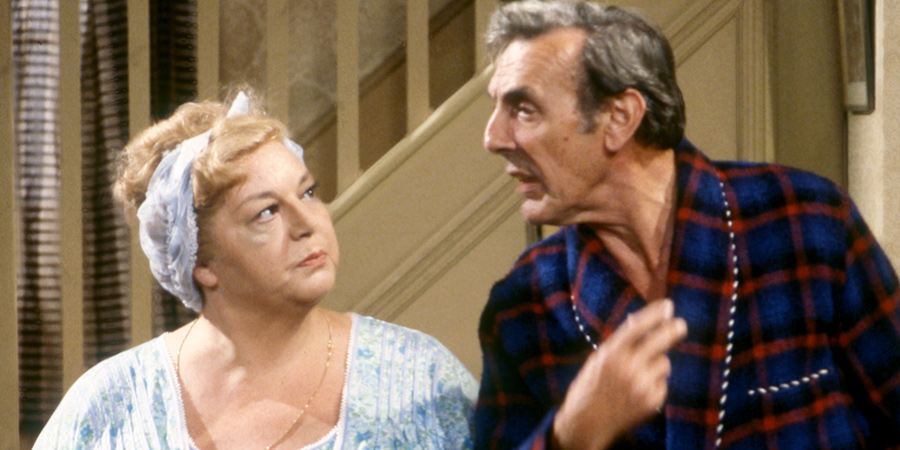
The rest of the album is taken up with spoken word sketches which, like the songs, delight and perplex in equal measure. Penny Forum is perhaps the best of the bunch, with Eric as a provincial English mayor dealing with Hattie, who puts in a wonderful turn as a rich American in search of a present for her husband. Her attempts to buy a 'beautiful edifice' in the high street - which turns out to be a gentleman's toilet complete with obscene graffiti - is a classic piece of timeless British toilet humour. The final track on the LP, Many Happy Returns is another success, seeing Eric as an accountant perusing the accounts of Hattie's grandiose actress who is overspending with gleeful, hapless abandon.
Elsewhere on the album, At Home parodies the industrial tensions of the early 1960s as on-strike Eric is nagged and berated by Hattie to put aside his petty grievances over tea breaks and return to work. The partly improvised style of the sketch results in a few hesitations and false starts that mar its humour ever so slightly. That niggle is much more apparent on the other B-side track, Interview, which relies a lot more on the ability of Eric and Hattie to riff off each other without a script. Hattie interviewing the actor Stone Bonkers about his new religious epic has many good ideas, but there is a strong sense that a bit more work on the script could have ironed out the pauses, hesitation and numerous wrong turns that prevent it from being a classic.
Those minor grievances aside, the curate's egg that is Eric & Hattie & Things!!!! has plenty of enjoyable moments. Many established TV and radio shows of the time - such as Hancock's Half Hour, The Rag Trade and Steptoe And Son - were content to rely on the release of soundtrack albums lifted directly from broadcast episodes in order to satisfy their loyal audiences, so kudos and respect goes to Eric Sykes and Hattie Jacques for attempting something a little bit bolder, different and experimental. That the single failed to trouble the charts and the album likewise, is unfortunate, but the series Sykes And A... (and its '70s reboot) remain comedy classics to this day, and Eric Sykes remains one of the hardest working and funniest men to have graced our screens.
Help us publish more great content by becoming a BCG Supporter. You'll be backing our mission to champion, celebrate and promote British comedy in all its forms: past, present and future.
We understand times are tough, but if you believe in the power of laughter we'd be honoured to have you join us. Advertising doesn't cover our costs, so every single donation matters and is put to good use. Thank you.
Love comedy? Find out more